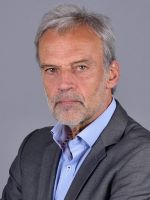From Global Art History to Active Matter
The lecture traces the concept of art history as an academic discipline in its continuities and ruptures, starting from Franz Kugler's Handbuch der Kunstgeschichte (1842), which took a vertical and horizontal look at images of all times and all peoples, from the handaxe to the present. In the wake of rising nationalism, the scope was subsequently largely restricted to European art history, despite the continued existence of universal concepts. Kugler’s concept, however, survived as a marginal definition of art historical material as a pictorial science, from the "medieval" shoe buckle to the icon. This concept of art history was advanced in particular in the beginning of the 20th century by Alois Regel and Aby Warburg. The pathos of the National Socialists was directed against this non-hierarchical art history, which, in dire straits, had to emigrate with the Warburg Library to London in 1933. Warburg’s concept remained largely alien to the art history of England, which was only established at the universities after 1945, so that visual studies was able to push into the emerging gap. Given the digital demands of the present as well as the need to capture a digital history of art, art history continues to offer itself as a viable parent discipline to what is often considered as separated visual studies. Another challenge of today, seemingly opposed to the digital, is the "material turn". In view of the stratification of the traditional art historical concepts of matter, material, and form, it could be met with the new concept of an active morphology.
Biography
Horst Bredekamp, born 29 April 1947 in Kiel, Germany, studied art history, archaeology, philosophy and sociology in Kiel, Munich, Berlin and Marburg, where he received his PhD in 1974. After an internship at the Liebieghaus in Frankfurt, Main (1974-1976) he became assistant professor at the University of Hamburg, where he tenured as Professor of Art History in 1982.
Since 1993 he is a Professor at the Humboldt University of Berlin. From 2003-2012 he has been a permanent fellow of the Institute for Advanced Study in Berlin and from 2015-2018 was one of the three founding directors of the Humboldt Forum. Since 2019 he is Senior Co-Director of the Cluster of Excellence “Matters of Activity” at Humboldt University.
He has published over 30 books and more than 700 articles. His research foci lie in the fields of Political Iconology, Iconoclasm, Romanesque Sculpture, Renaissance and Mannerist Art, Art and Technology with Galileo, Hobbes and Leibniz, and New Media.
Among his awards are the Sigmund Freud Award (2001), the Aby M. Warburg Award (2005), the Max Planck Research Award (2006), and the Schiller-Award (2018). He is a member of the Berlin-Brandenburg Academy of the Sciences and Humanities (since 1995), the Leopoldina (since 2004), the European Academy (since 2010), the American Academy for Arts and Sciences (since 2016), and the Ordre pour le Mérite (since 2014) and has been awarded an honorary doctorate (Dr. h.c.) in Philosphoy by the Università di Torino in 2022.
Website: http://www.kunstgeschichte.hu-berlin.de/personen/professorinnen/horst-bredekamp/


